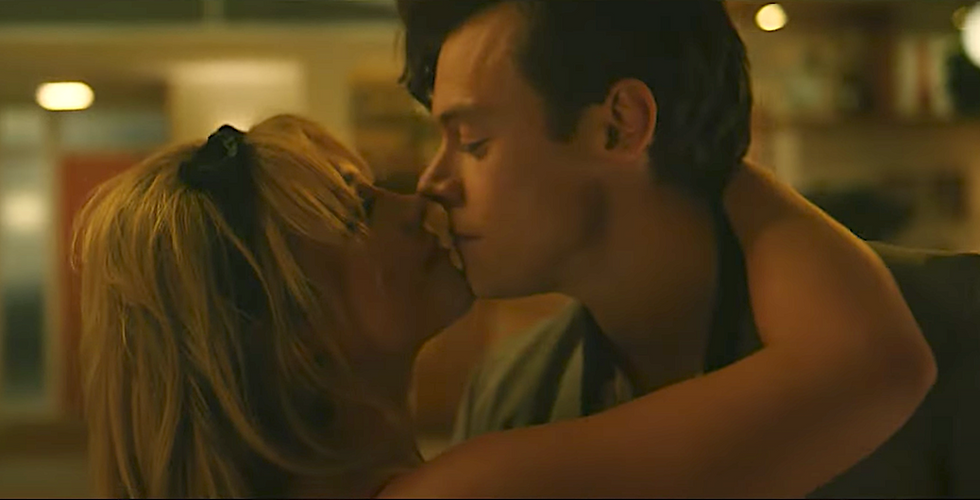Don't Worry Darling // Film Review
- James McCleary
- Sep 6, 2022
- 4 min read
Updated: Sep 11, 2022
First off, the elephant in the room; Harry Styles is perfectly fine in this movie. In fact he’s often pretty good. His wobbley accent is a late-game plot point, and releasing that clip without context was, in retrospect, wildly unfair.

I wish I could say the same for the rest of Don’t Worry Darling, a dumb and often dull psychological thriller that relies on dream logic imagery and showy monologues to distract from the fact that, by way of its setup, nothing can actually happen for the first two thirds. These first ninety minutes are instead packed little more than a hefty jukebox of 50s tunes and a desperate reliance on Florence Pugh’s power of facial expressions to keep us on the hook. And while it might just about get away with being passable entertainment, the truth is that this is furthest thing from the bold and outrageous work of feminist cinema that director Olivia Wilde has been promising over the past two years.
Don’t Worry Darling stars Pugh as Alice, a blissful 1950s housewife whose life extends no further than cooking dinner for her husband Jack (Harry Styles), gossiping with the other wives in her neighbourhood and occasionally, jarringly, being treated to lots of oral sex. Wilde has said that her intention was to emphasise female pleasure, but in a film that is otherwise entirely about internalised misogyny and the social imprisonment of women, it doesn’t quite track. This is a world designed to put women in servitude, which makes the motif feel a bit superfluous, if not entirely random.

Alice’s time in paradise (or Wonderland, as seems to be the film’s intention - the character’s name has been changed by Wilde from the original script, which called her Evelyn) gradually falls apart when she starts to suspect that all is not right in their idyllic company town of Victory, California. Nobody can tell her what any of the men do at the ‘headquarters’ all day, nor how any of the couples arrived here or even met (which Pugh exposes in the film’s one truly chilling scene, which pits her against Chris Pine’s Jordan Peterson impression - a clear highlight of the film which begs the question of why the film doesn’t give its two strongest actors more time together). Alice’s suspicions then turn to dread when an old friend, Margaret (KiKi Layne) suffers what appears to be a fit of hysteria at a house party and is dragged away screaming “none of this is real.”
The film clearly owes to The Stepford Wives, though Wilde has named any number of films as reference points for the film (most of which directly spoil the the third act, bizarrely - I won’t name them here, but it’s all just a google away). In reality, the film doesn’t really know what it’s trying to do or say. There are gags, but it’s never clear whether they are intended for relief or further unease (this is particularly the case for the husbands of Pugh’s neighbours, whose casual misogny is played for laughs more than once, and at least in my cinema occasionally succeeded). There are also traces of horror, and even the occasional jump scare, in the film’s early movements, though these ultimately come to nothing, as the film ends without addressing them.

This lack of coherence is one of two key issues running through Don't Worry Darling; for a film that presents itself as a puzzlebox, the plot here needs to be a lot tighter in its logistics. Characters and mysteries are constantly trailing off without rhyme or reason, including Pine himself, who makes the most of his few scenes as the film’s sleazy and dangerously charismatic villain. Worse still is the role given to Gemma Chan as his wife, who works hard to make something of her minimal screentime and one jarring turn at the climax intended to be triumphant, despite the nothingness of the character beyond an assigned gender.
This is the film's other recurring problem, as Wilde appears to believe that a character’s gender is sufficient characterisation to make her a heroine, which crudely undermines the film’s ostensible theme of feminine non-conformity. For as much as its plot logistics don’t make a lick of sense or make for satisfying payoffs, the conversation the film clearly wants to open about modern feminism falls frustratingly flat at pretty much every turn. Wilde has nothing to say about gender identities beyond the epic extremes of incels and doll wives, with no space for the gray areas where most contemporary misogyny tends to manifest. Confirming this is the film’s final twist, which takes on a massive issue in contemporary society and oversimplifies it to the point of futility. No points for guessing what topic that might be but, as with her film references, Wilde has not held back in interviews, so it shouldn’t be hard to guess.

I won’t touch on the behind-the-scenes drama circling the film, but were Don’t Worry Darling to release free of scandal and controversy, I imagine it would probably come and go without much fuss nor debate. The hard truth is that the film less outright terrible and more toothless, with underdeveloped themes and flavourless plot disguised in 50s glamour. Even an exemplary performance from Pugh and game performances from those around her (once again, yes, I am including Styles) aren’t enough to bring nuance to a project that wants to be about so much, but just isn’t a tenth as clever as it thinks it is.
Reviewed at Venice Film Festival 2022.















Comments